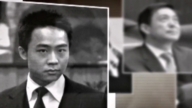【新唐人2012年10月3日讯】中共政治局在“十八大前夕”做出对薄熙来的处理决定,被认为是“胡习联手胜出”。薄熙来是中共元老薄一波的儿子,曾被认为有资本与习近平分庭抗礼。近期,海外媒体竞相报导习近平上世纪80年代,在河北正定县当基层干部的经历。报导认为,“扎根农村”和“太子党”,是中共选择领导人的重要背景之一。习近平在河北正定的经历,显然帮助他完成了“扎根农村”这一任务。但这位即将上位的“太子党”,面对当前内政、外交或经济等多重危机的局势,他的下一步,关系着中国大陆13亿人的未来,那么,习近平准备好了吗?请看下面这一则报导:
《纽约时报》报导,30年前,当习近平在北京受到局部阻力的时候,他的父亲——中共元老习仲勋将他调到河北正定农村。习近平在正定的经历也帮助他与其他“太子党”建立了联盟关系,在以后起到了相当大的作用。
报导说,习近平在正定最突出的地方,是有关经济以及个人的关系上。习近平在正定的经历给他的政治生涯打开了一扇窗。不过,香港分析人士金钟对《纽约时报》表示,人们多认为习近平是新一代的技术官僚型领导,但他认为,习近平仅仅是他父亲那一代的“红色官僚的延续”而已。
“文革”期间,习仲勋被打倒,当时还不到16岁的习近平,被迫前往陕北插队。1969年到1975年,习近平在陕西省延川县农村插队劳动,曾在生产大队担任党支部书记,直到1975年被推荐上“清华大学”。
美国纽约民主人士、“中国民主党全国联合总部”副秘书长穆文斌表示,习近平在基层生活过,对民间疾苦有所感受,他在福建和浙江的作为也比较踏实。
美国纽约民主人士 穆文斌:“至少他们曾经被打倒过,吃过毛左派的苦头,所以他肯定不希望看到毛左派上台的。”
不过自由撰稿人刘念春向《新唐人》表示,虽然习近平少年时曾被打成“反革命”,认识到中共斗争的残酷性,可能在说话和做事上变得更为谨慎。但是,刘念春认为,中共当前面临的危机,根源于中共政权不受制约的体制,与中共领导人的替换,关系不大。
自由撰稿人刘念春:“可是对于中共来说,不管它怎么变,如果共产党还是不受监督、不受制约,那中国还会像以前一样,灾难重重。知识份子50万被打成右派,那也没经过法律。”
有评论认为,当今的中共当权者以及即将当权的人,可能都感受到:中国当前面对的危机,也许比100年前的清政府,更加直接和紧迫。比如:当前中国的许多产业出现了生产过剩,但是共产党还在继续营造假的GDP,而且“保8”的经济增长承诺,也已经成为难以实现的悬念。另一方面,中共刺激经济的那些钱,造成了极度浪费和重复投资。
“四五论坛”创办人之一杨靖:“老百姓认为不管他是什么经历的人,老百姓就看你办实事,和看这个党的本质是否改变了,是否给老百姓办实事,然后跟老百姓站在同样的立场上,面对现在复杂的现实。”
另外,在内政方面,由“王薄案”引爆的中共高层内斗,其中一个无法绕过的核心问题,就是法轮功的问题,习近平上位后有勇气去面对吗?
分析人士指出,不要幻想胡锦涛这一代,或者十八大之后,新一代的中共领导人对法轮功有任何不同的作为,这种幻想等于是“与虎谋皮”。
采访/常春 编辑/周平 后制/萧宇
Is Xi Jinping Ready?
Chinese Communist Party’ (CCP) Politburo made a decision
on settling Bo Xilai’s case before its 18th Congress.
This is viewed as a victory of Hu Jintao and Xi Jinping.
Bo Xilai is the son of CCP’s veteran Bo Yibo, and was
once considered a strong Xi Jinping’ rival for the top post.
Recently overseas media reported Xi Jinping’s experiences
as cadre in Zhengding County, Hebei Province in the 80’s.
The reports stated, settling in rural areas and a princelings’
background are key CCP criteria for choosing its leaders.
Xi Jinping’s experience in Zhengding apparently meets
the condition of settling in rural areas.
But this upcoming leader from the princelings’ group
faces many internal, diplomatic and economic challenges.
His next steps will determine the future
of China’s 1.3 billion people. Is Xi Jinping ready?
The New York Times reported that 30 years ago,
Xi Jinping encountered some resistance in Beijing.
Thus his father, the CCP veteran Xi Zhongxun,
transferred him to Zhengding Village in Hebei Province.
Xi Jinping’s experience there helped him establish
an alliance with other members of the “princelings group," which played a considerable role in the future.
The report says, Xi Jinping’s most prominent achievements
in Zhengding is related to economic and personal relations.
It opened up a window
towards his political career.
However, HK analyst Jin Zhong told New York Times,
that most people think Xi is a leader of the new generation.
Yet, Jin thinks Xi is merely a “red bureaucracy continuation”
of his father’s generation.
When Xi Zhongxun was ousted in the Cultural Revolution,
Xi Jinping was under 16 years of age.
He was forced to join the farmers
at north Sha’an Xi Province.
From 1969 to 1975, Xi Jinping worked as a farmer there,
and was once the party secretary of the local production team.
He was recommended for admission
to Tsinghua University in 1975.
Mu Wenbin is a democracy activist and deputy secretary
of China Democracy Party National Alliance Headquarter.
Mu expressed that Xi Jinping experienced people’s hardship
when he was at the grassroots level.
His work at Fujian Province and Zhejiang Province
were also down to earth.
Mu Wenbin: “They were once overthrown.
They suffered from the Maoists and leftists.
So they absolutely do not want
those people to take the power again.”
Freelancer Liu Nianchun told NTD,
that indeed, Xi Jinping had suffered as a teenager.
And exactly because Xi is aware of the CCP’s cruelty,
he may say and do things more cautiously.
The current CCP crises is rooted deeply in the CCP regime,
and has little to do with the replacement of CCP leaders.
Liu Nanchun: “No matter what CCP does, if not monitored,
or controlled, China will be as before, full of disasters.
The 500,000 intellectuals were labeled as “rightists”
and persecuted without any legal process.”
Experts said, both current and future CCP leaders have felt,
that today’s China crises might be more direct and urgent, than those the Qing government faced 100 years ago.
For example, many industries in China have overproduction,
but the CCP continues to create fake GDP.
The commitment to 8% economic growth
has become difficult to achieve.
On the other hand, the money CCP used to stimulate
economy caused huge waste and duplication of investment.
Yang Jing, April 5th Forum establisher, said about the issue:
“People do not care about past experiences, but want to see how things will be done now.
They want to see if the CCP has changed,
can do good things, and stand together with the people.
If it has the courage and solutions to solve the problems
of the current complex situation.”
Another aspect of CCP’s inner affairs and infightings stirred
by Wang Lijun’ and Bo Xilai’s cases, is the Falun Gong issue.
Will Xi Jinping have the needed courage
to face this issue?
Analysts seem pessimistic on the prospects of Hu Jintao’s,
or the announced after CCP’s 18th congress new leadership, doing something different on this sensitive issue.





























